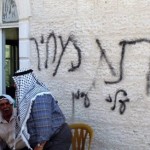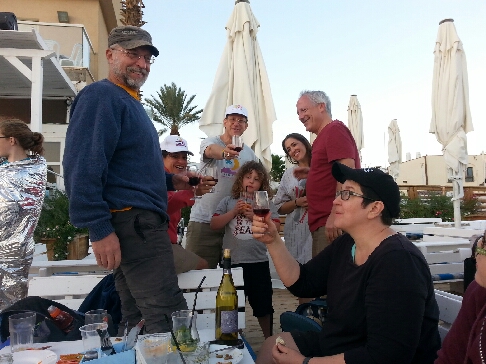Price Tag — A violation of Jewish Law
Originally published by the Jerusalem Post, September 20, 2011.
By Rabbi Barry Leff
There’s an old joke which illustrates the foolishness of the tag machir (price tag) campaign.
A Chinese guy and a Jewish guy are walking along the street, and all of a sudden the Jewish guy punches the Chinese guy in the mouth. “What was that for?” asks the Chinese guy.
“That was for Pearl Harbor!” says the Jew.
“Pearl Harbor? But that was the Japanese. I’m Chinese!”
“Chinese, Japanese, what’s the difference?” says the Jew.
They keep walking, and after a few minutes the Chinese guy slugs the Jew in the face.
“Ow, what was that for??!” he asks.
“That was for the Titanic!” charges the Chinese guy.
“The Titanic? That was an iceberg!”
“Iceberg, Goldberg, what’s the difference?”
Jews have been the world’s favorite scapegoats since at least the 4th century, when Constantine made Christianity the official religion of the Roman Empire. So Jews, of all people, should be sensitive to how terrible it is to make someone a scapegoat.
Yet that is exactly what the perpetrators of the “price tag” campaign are doing. In recent weeks two mosques and an IDF base have been attacked by vandals, most likely because extremist settlers were unhappy with the Israeli government’s dismantling of illegal settlement outposts. Torching a mosque because of an action of the Israeli government makes as much sense as punching Goldberg because an iceberg sank the Titanic. Such behavior is not only stupid, it is a clear violation of halacha [Jewish religious law]. Since most of these extremist settlers give at least the appearance of being religious, with kippot [skullcaps] on their heads and tzitzit flying, their behavior is especially disgraceful.
“Price tag” attacks violate halacha in many ways. First, the Torah clearly forbids vicarious punishment, punishing someone other than the offender.
Deuteronomy 24:16 says “The fathers shall not be put to death for the children, nor shall the children be put to death for the fathers; every man shall be put to death for his own sin.” The Tanach [Hebrew Bible] gives an example of this principle put into practice: in Chronicles we are told that the First Temple era King Amaziah did not kill the sons of the people who killed his father, even though he may have been tempted to, because of this passage in the Torah.
The principle is clear: everyone is punished for his own sin only, and if you would not punish a son for the sin of a father, al achat kama v’kama, all the more so, you would not punish a stranger.
When the perpetrators of the price tag campaign attack a mosque they are also guilty of several other sins. They are guilty of violating the principle of bal tashchit, not to carry out wanton destruction. This is based on a passage in the Torah that prohibits chopping down fruit-bearing trees, even in a time of war. In his Mishneh Torah, Rambam (Maimonides, 12th century) says, “Not only the trees, rather whoever breaks vessels and tears garments, destroys a building and obstructs a wellspring, or wastes food in a destructive way transgresses the mitzvah of bal tashchit.”
The Shulhan Aruch, the leading Jewish law code, clearly states that a person is liable and must pay if he damages someone else’s property, even if he did not personally benefit from the damage.
But the greatest sin the perpetrators of the price tag campaign commit is the sin of hillul Hashem, the desecration of God’s name. Attacking a mosque – a house of worship of the same God that we worship – and burning Korans that do reverence to many of the patriarchs, matriarchs and prophets in the Torah –makes Judaism look bad. It gives our religion, and by extension, our God and Torah, a horrible reputation. It makes Judaism appear immoral, insensitive and disrespectful toward others in the eyes of the nations.
Of those who desecrate God’s name the Talmud says, “this man studied the Torah: Look, how corrupt are his deeds, how ugly his ways; of him Scripture says: ‘These are the people of the Lord, and are gone forth out of His land.’” It is as if they have abandoned God’s land, not “settled” God’s land.
Attacking an IDF installation is admittedly not quite as bad in this regard as attacking a mosque, but is still a violation of all of the above principles, including desecrating God’s name. People who would do such things in the name of Torah should be condemned by everyone who holds Torah dear.
Desecrating God’s name is such a serious sin that the Talmud, in tractate Yoma, tells us that even repentance cannot suspend the punishment, and Yom Kippur cannot atone for the sin; together repentance and Yom Kippur only suspend punishment, but do not atone.
As pointed out by Rabbi Yosef Blau in his recent piece in The Jerusalem Post, some yeshivas in the settlements are teaching values that may lead some of the “hot-headed youth” to engage in price tag actions. These yeshivas neglect the welfare of their students’ souls if they fail to also teach them that these actions are grave sins.
The writer is a business executive and rabbi. He serves as chairman of the board of directors of Rabbis for Human Rights. Opinions expressed here are his own.


